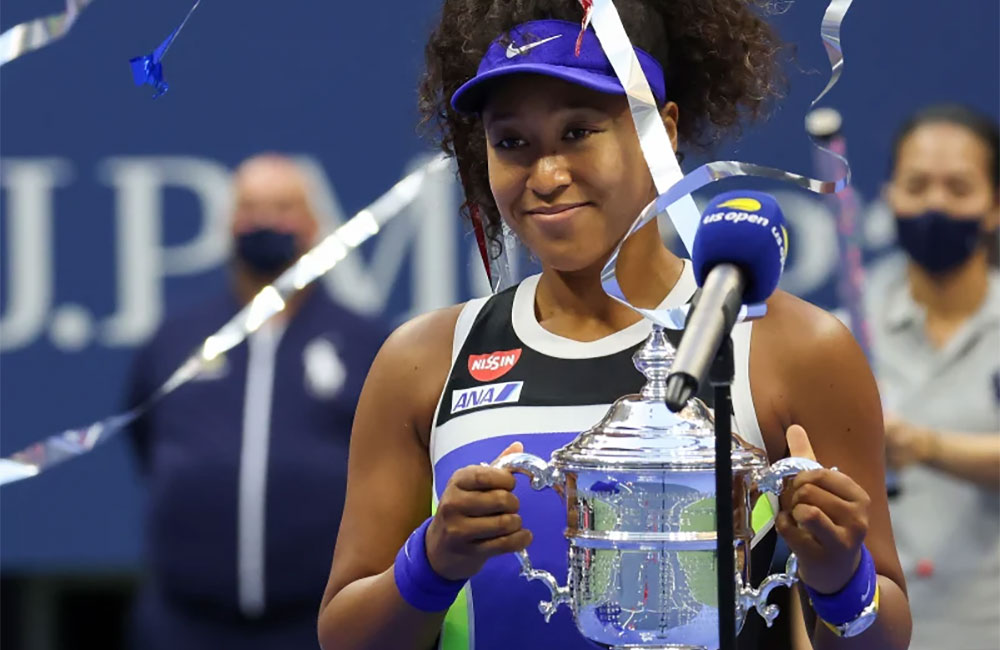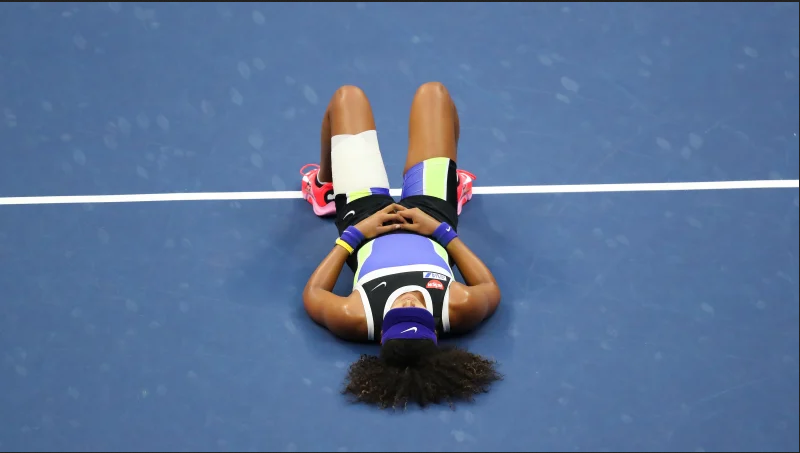Naomi Osaka returned to the fore in women's tennis Saturday by coming back to defeat Victoria Azarenka and win her second U.S. Open.
Osaka's 1-6, 6-3, 6-3 victory capped a run of powerful play and political activism in New York. She wore seven different masks with different names for each of her matches to honour Black victims of violence. She walked on court Saturday with a mask bearing the name of Tamir Rice, a 12-year-old boy shot and killed in Cleveland by a white police officer in 2014.
"The point was to make people start talking," Osaka said at the awards ceremony.
Naomi Osaka of Japan lays down in celebration after winning her Women's Singles final match against Victoria Azarenka of Belarus on Day Thirteen of the 2020 US Open at the USTA Billie Jean King National Tennis Center on September 12, 2020 in the Queens borough of New York City. Getty Images
Osaka's win Saturday came in radically different conditions than her first title run in New York in 2018.
In that final, she defeated Serena Williams in a tumultuous straight-set match that turned ugly when Williams clashed in Arthur Ashe Stadium with chair umpire Carlos Ramos, who called three code-of-conduct violations against Williams.
The crowd, unclear on the rules and upset at the treatment of Williams, booed during the awards ceremony, leaving Osaka in tears shortly after her first Grand Slam singles title.
But Ashe Stadium was nearly empty Saturday, as it has been throughout this unusual U.S. Open where fans were not permitted because of the coronavirus pandemic.
What little crowd there was in attendance never became a factor, and though Osaka started very slowly against Azarenka, she gradually found her range and became the first player in 26 years to win a U.S. women's singles final after losing the first set.
The last player to manage it was Arantxa Sánchez Vicario, who rallied to defeat Steffi Graf in 1994.
Osaka, 22, who represents Japan and is based in the U.S., is 3-0 in Grand Slam singles finals. With her huge serve, powerful groundstrokes and improved fitness, she appeared ready to take command of the women's game when she won the 2018 U.S. Open and 2019 Australian Open.
But she surprisingly split with her coach Sascha Bajin shortly after that victory in Australia and struggled to recapture the same sparkling form.
Last year, as she defended her U.S. Open title, Osaka was beaten in the fourth round by Belinda Bencic. At the Australian Open in January, she played an error-filled match and was upset in the third round by Coco Gauff, then 15, an American whom Osaka had beaten in straightforward fashion at the 2019 U.S. Open.
Osaka was in evident disarray, but then came the five-month tour hiatus because of the pandemic. Osaka, the biracial daughter of a Haitian father and Japanese mother, became deeply involved in the social justice movement, attending a rally in Minneapolis and speaking out on social networks and elsewhere.
When she returned to the tour for a two-tournament double header in New York, with the players in a controlled environment, she continued her activism. She initially declined to play her semifinal match in the Western & Southern Open the week before the U.S. Open, in solidarity with athletes in professional basketball, baseball and soccer who were protesting systemic racism and police violence.
Tour officials responded by cancelling the entire day of play, and Osaka went on to reach the final, withdrawing with a left hamstring injury before facing Azarenka.
The hamstring was still strapped Saturday as she came back to beat Azarenka in the final.
Azarenka, 31, from Belarus, lost to Williams in classic U.S. Open finals in 2012 and 2013 but rallied to defeat the 38-year-old Williams in a ferociously contested semifinal Thursday and started just as convincingly Saturday.
Azarenka was unseeded but hardly a tennis outsider. She was No. 1 for 51 weeks in 2012 and 2013 and won two Australian Open singles titles before Williams reasserted herself at the top of the women's game and Azarenka dropped back.
She had injuries, painful breakups with boyfriends and coaches and, most traumatically, a lengthy and bitter custody dispute over her now 3-year-old son, Leo, who stayed with Azarenka and her mother and team at a private home she rented near the USTA Billie Jean King National Tennis Center for the tournament.
She would have been the first mother to win a Grand Slam singles title since Kim Clijsters won the Australian Open in 2011. As Azarenka dominated the opening set, hitting nearly every first serve in play and controlling the rallies, it appeared she might win in a hurry. Osaka threw her racket at one stage in frustration as her unforced errors piled up.
"I just thought it would be very embarrassing to lose this in under an hour," Osaka said, explaining that she told herself to "stop having a really bad attitude."
Her mood and game improved dramatically as the final progressed, while Azarenka failed to sustain her level of play. After losing the second set and falling behind 1-4 in the third, Azarenka made one more surge, battling through a five-deuce game to hold serve and then breaking Osaka's serve in the next game to close the gap to 3-4.
But at 30-30 on Azarenka's serve in the next game, the match turned for good as Osaka won a high-velocity rally to get a break point and then converted it as Azarenka lined up a forehand, went for an inside-out winner and missed just wide.
Osaka, who has yet to lose a major final, then closed out the victory by holding serve as Azarenka's last shot, a backhand, struck the net. Osaka tapped rackets with Azarenka at the net — another sign of these changed times — and then lay on her back on the court and took a moment to savor the moment.
"I always see everyone sort of collapse after match point, but I always think you may injure yourself, so I wanted to do it safely," she explained. That seemed an appropriate approach at a tournament where staying safe was the top priority, as players were tested for the virus regularly and restricted to their lodging and the tournament site.
"It's not easy times in the world right now," Azarenka said, holding back tears in her post-match speech in the near-empty stadium. "So I'm very grateful for the opportunity to play in front of millions of people watching on TV, unfortunately not here."
"I thought it would be embarrassing to lose this in under an hour," Osaka said in her victory speech. "I fought for every match."
(The New York Times)



Leave your comments
Login to post a comment
Post comment as a guest